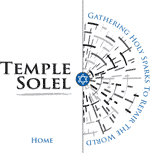According to Wikipedia (I'm writing this on Thursday), the numbers are stark:
- 5692 people are confirmed dead
- 2409 others are wounded
- 9522 are officially missing
There are several basic Jewish responses that our tradition teaches:
PRAYER: Prayer has always been an authentic Jewish response, when we are forced to witness the needless and senseless suffering of others. Here's one prayer that is appropriate, based on material written by Rabbi Jonathan Wittenberg of London:
Prayer In Response To Disaster
God, be with all those who mourn and pray for all of the people who have been affected by the recent tragedy in Japan. May our solidarity strengthen them. God, help them manage to live on in spite of their pain. Give them courage, hope and purpose.
God, be with all those who have been traumatised, young and old. Bring trust and hope back into their lives. May the love they receive prove stronger than the horror they have experienced.
God, be with all those, of all peoples, who are suffering.
God, remove thoughts of violence and hatred from every heart. Strengthen our readiness to understand one another. Give us tolerance and insight. Teach us all to live together in peace.
May Isaiah's words speedily come true:
לֹא-יָרֵעוּ וְלֹא-יַשְׁחִיתוּ בְּכָל-הַר קָדְשִׁי כִּי-מָלְאָה הָאָרֶץ
דֵּעָה אֶת ה’ כַּמַּיִם לַיָּם מְכַסִּים
'They shall not hurt nor destroy in all my holy mountain; for the earth shall be full of the knowledge of the Lord, as the waters cover the sea.'
And let us say 'Amen'.
***
TZEDAKAH: Beyond praying, our tradition has always empowered us to DO SOMETHING about the brokenness of our world. And, short of hopping on a plane to Japan to lend a hand (which may not be advisable for a number of logisitical reasons - i.e. you'd just be another homeless person needing shelter), your best bet is to donate. Down the line, charities will probably be in need of goods. But right now, what they need most is our money. Consider making a small charitable donation to the American Red Cross or you can donate via the Jewish communal response to the disaster: the Jewish Coalition for Disaster Relief.
***
There's one other authentic Jewish response that might be worthy of our consideration at a time like this: FASTING.
I know fasting is such a strange thing to do...something that many of us typically only do once a year - on Yom Kippur.
But, actually, our tradition has a long history of communal/individual fasting when the community is facing a pending disaster that they are seeking to avert.
I am writing this on Thursday, which our Jewish calendar designates as Ta'anit Esther: the Fast of Esther. According to the Book of Esther (which we will reads on Purim this weekend), Esther fasted just before she confronted King Ahashuerus of Haman's pending genocide against the Jewish people. Indeed, our tradition ascribes the miraculous happy ending of the Book of Esther to her fast...as if her fasting swayed God toward a place of compassion and Divine Intervention.
As for the Japanese situation: we don't know how it is going to end yet. Several Japanese nuclear facilities are on the brink of major accidents...accidents which could harm tens of thousands of people that live in their vicinity.
Just as Esther hoped for a miraculous happy ending so many thousands of years ago, we too hope for the same in Japan. So many have already suffered. But a miracle now could prevent more suffering, more illness, more homelessness, and more loss of life.
So, at some point in the next few days, I would invite you to fast...either doing it the traditional way by abstaining from food and water from sunrise to sunset. Or by skipping a meal. Or by simply skipping a special treat that you might otherwise indulge in on a regular basis. Take on a little bit of suffering on your own - in order to prevent the suffering of others.
Even as we rejoice over the happy ending of the Purim story, we humbly temper our celebrations, knowing that others are hurting in our world today.
Shabbat Shalom,
Rabbi Brown






indeed... a happy ending for all would be a great thing to pray and fast for!
ReplyDelete